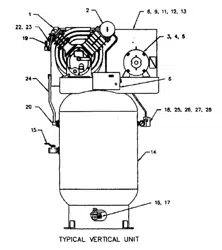Loading ...
Loading ...
Loading ...

10
BELT ADJUSTMENT
CHECKING BELT TENSION. Check belt tension should be
occasionally, especially if looseness is suspected. New belts must
also be properly tensioned upon installation.
TENSIONING BELTS. Belt tensioning can be achieved by
loosening the motor or engine anchor screws, pushing the motor or
engine away from the pump, and retightening the motor or engine
anchor screws. Some units are equipped with a belt tensioning bolt
that, when turned, pulls the motor or engine away from the pump.
Otherwise, the motor can be easily moved by placing a prying tool
beneath it. A commercially available spreader or other belt
tensioning device can also be helpful.
BELT TENSION f_J_
i3oL..r _ /i'l!
Follow the procedures outlined below to correctly set and measure
belt tension on electric motor and gas engine models including
2340, 2475, and 2545 (with "A" belt type only). Refer to the
following illustration for a visual representation.
.............................It) _LT 8PAN ..............................
I)EFLECTIO!I _ .._/__"
O-RINGS . i ) DIRECTION OF 1
'. I/ FORCE APPLIED \
P# gT'gX,
(READ DOWN)
DEFLECTION
DISTANCE SCALE
(READ UP)
\
J
/
....... i /
1. Lay a straight edge across the top outer surface of the belt drive
from pulley to sheave.
2. At the center of the span, perpendicular to the belt, apply pressure
to the outer surface of the belt with a tension gauge. Force the belt
to the deflection indicated in the BELT TENSION TABLE in the
DIAGRAMS & TABLES section. Compare the reading on the tension
gauge to the table.
Follow the procedures outlined below to correctly set and measure
tension on 7.5 through 30 horsepower models 2545, 7100, 15T and
2000 with "B" and "C" belt types.
1. Measure the span length (t) of the drive.
2. Determine the amount of deflection (in inches) required to measure
deflection force (in pounds) by multiplying the span length (t) by
1/64. For example, a 32" span length multiplied by 1/64 equals 1/2"
of deflection required to measure deflection force.
3. Lay a straight edge across the top outer surface of the belt drive
from pulley to sheave.
4. At the center of the span, perpendicular to the belt, apply pressure
to the outer surface of the belt with a tension gauge. Force the belt
to the predetermined deflection calculated in step 2. Compare the
reading on the tension gauge to the BELT TENSION TABLE in the
DIAGRAMS & TABLES section.
Ensure the pulley and sheave are properly aligned and the motor
anchor screws are adequately retightened prior to restarting the
compressor.
A CAUTION Improper pulleylsheave alignment and belt tension
can result in motor overload, excessive vibration,
and premature belt and/or bearing failure.
To prevent these problems from occurring, ensure the pulley and
sheave are aligned and belt tension is satisfactory after installing
new belts or tensioning existing belts.
TANK INSPECTION
The life of an air receiver tank is dependent upon several factors
including, but not limited to, operating conditions, ambient
environments, and the level of maintenance. The exact effect of
these factors on tank life is difficult to predict; therefore,
Ingersoll-Rand recommends that you schedule a certified tank
inspection within the first five years of compressor service. To
arrange a tank inspection, contact Ingersoll-Rand.
If the tank has not been inspected within the first 10 years of
compressor service, the receiver must be taken out of service until
it has passed inspection. Tanks that fail to meet requirements must
be replaced.
A WARNING Failure to replace a rusted air receiver tank could
result in air receiver tank rupture or explosion,
which could cause substantial property damage,
severe personal injury, or death. Never modify or
repair tank. Obtain replacement from service center.
Loading ...
Loading ...
Loading ...
